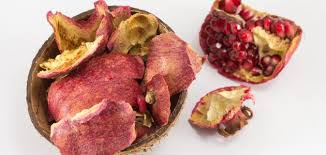Pomegranate Peel
Scientific Name: Punica granatum
English Name: Pomegranate Peel
Botanical Description
The pomegranate (Punica granatum) is a deciduous tree or shrub that grows to a height of 5-8 meters. It has glossy green leaves and bright red flowers that develop into spherical fruits with a thick and tough outer peel. The peel ranges in color from red to brown upon ripening and contains bioactive compounds beneficial to health.
Types
Several varieties and cultivars of pomegranate differ in size, taste, and peel thickness, including:
Sweet Pomegranate: Has a sugary taste and relatively thin peel.
Sour Pomegranate: Has a tangy flavor with a thicker peel.
Moderate Pomegranate: Balances between sweet and sour flavors with medium-thickness peel.
Health Benefits & Medicinal Uses
Pomegranate peel is widely used in traditional and modern medicine due to its numerous health benefits, such as:
Digestive Health: Helps treat diarrhea and reduces intestinal inflammation.
Antibacterial & Antiviral Properties: Contains antimicrobial compounds that protect against infections.
Oral Health: Used in mouthwashes to treat gingivitis and reduce bad breath.
Antioxidant Effects: Protects cells from oxidative stress and slows premature aging.
Heart Health: Helps lower bad cholesterol levels and improve blood vessel function.
Immune Support: Rich in vitamins and minerals that strengthen the immune system.
Medical & Nutritional Uses
Used in the production of dietary supplements and health drinks.
Incorporated into skincare products as a natural anti-aging and anti-acne remedy.
Ground into powder or extracted as an herbal treatment for digestive issues.
Used in hair rinses to treat dandruff and strengthen hair roots.
Cultivation Methods
Grows best in fertile, well-drained soil, preferably sandy loam.
Requires a warm, sunny climate, thriving in semi-arid and tropical regions.
Needs regular but moderate irrigation to prevent root rot.
Propagated by seeds or cuttings, with cuttings preferred for maintaining genetic traits.
Medicinally Used Parts
Dried peels are used for medical and cosmetic purposes.
Extracts and essential oils from the peel are utilized in pharmaceutical and therapeutic products.
Planting Season
Best planted in spring (March – April) or autumn (September – October) for optimal yield.
Active Compounds
Flavonoids & Tannins: Powerful antioxidants that protect cells from damage.
Gallic Acid: Anti-inflammatory and antibacterial.
Ellagic Acid: Enhances skin health and strengthens immunity.
Polyphenols: Beneficial for heart health and improving circulation.
Export details to all over the world
Drying: Natural.
Type: Sliced pomegranate peels for exports
Packaging: Cartons and bags.
Package Weight: As per customer request.
Container: 40-foot container.
Sorting and Packaging: Automated.
Origin: Egypt.



